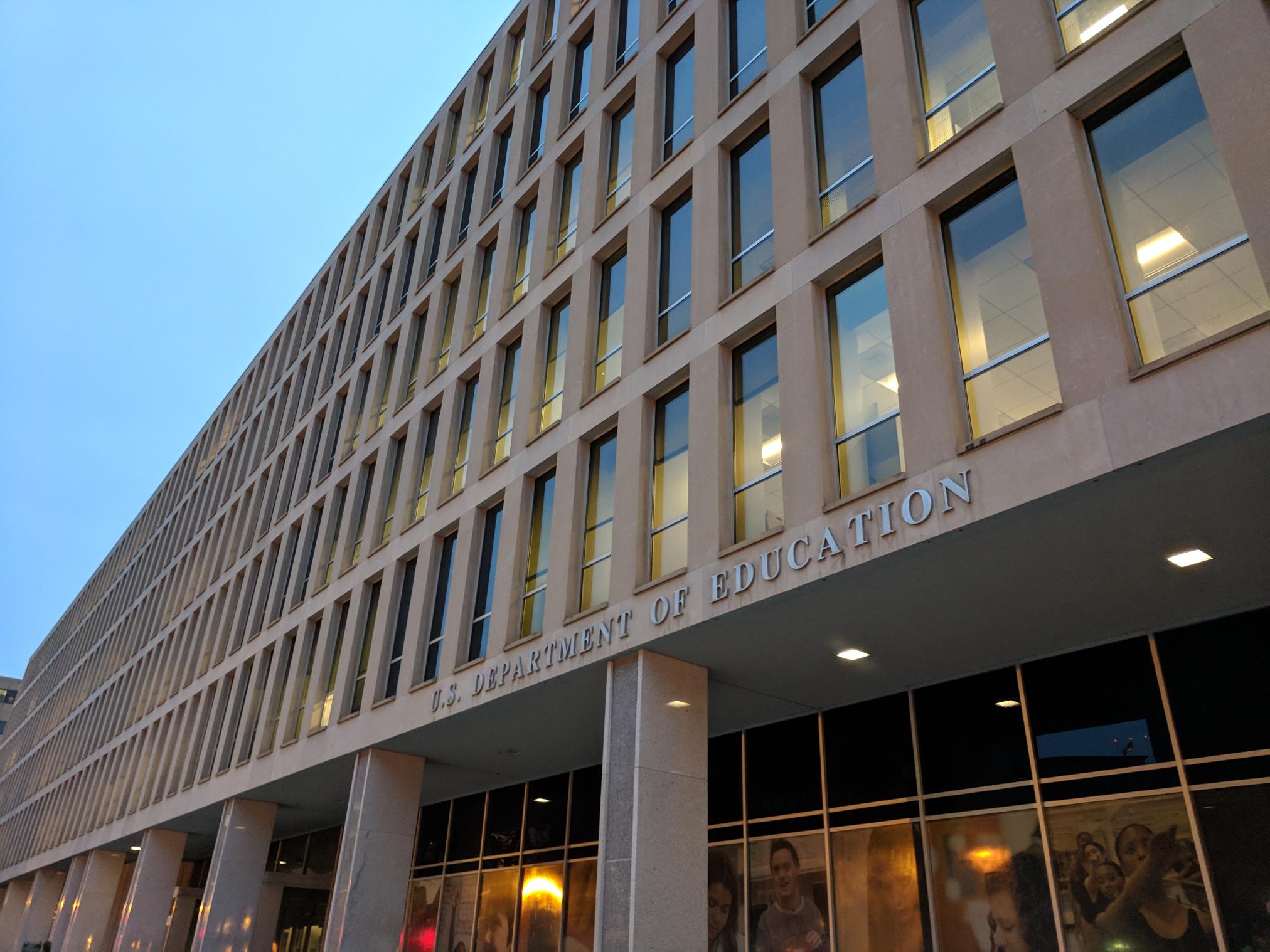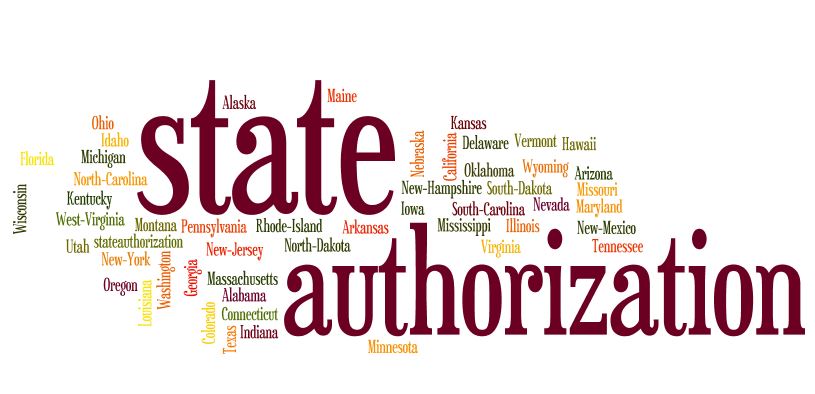The Department of Education has a long list of higher education regulations under consideration in its negotiated rulemaking process. As the calendar of meetings winds down, the path to agreement on most issues remains rocky, but not impossible. Lost in the reporting about disagreements has been the (at least modest) progress that has been made on some issues.
Please remember with this rulemaking that the results could change what you do every day as a higher education faculty or staff person. There are proposed changes to accreditation, the credit hours, distance education, regular and substantive interaction, getting aid for non-accrediting instruction, and much more.

As you may recall, there is a main committee on “accreditation and innovation” that will have final vote on the proposed issues. WCET’s Russ Poulin is serving on the “distance learning and educational innovations” subcommittee, which provides advice and suggested language on selected items. In this post, Russ will give some insights and observations from someone who is immersed in the process. We will briefly update you on some of the issues that we highlighted in our January 30 post and ask for your feedback on some questions.
Additionally, we are very pleased to announce NEW background and position papers created in a partnership between OLC, UPCEA, and WCET. We are pleased to work closely with our colleagues in these organizations.
It is very difficult to summarize many hours of discussions at the table and behind the scenes. We hope that this post gives you a taste of what is unfolding.
About the Rulemaking So Far…
With two out of the three sets of negotiating sessions now completed, we would be at the second intermission…if this were hockey. The latest news is that we already know we are heading into overtime with a full period of negotiating sessions just added for the first few days of April! We have learned from what has happened thus far. Reviewing those experiences will help guide us to the final buzzer.
The Department Staff Is Negotiating in Good Faith
There was much worry that the Department knew exactly how it wanted to proceed with the issues under consideration and that there would be little true negotiating. From his subcommittee experience, Russ believes:
The Department staff have been attentive in listening, have been extremely helpful, and have changed their minds on several issues from what they originally proposed.
In the main negotiating committee, the Department staff have commented several times on their commitment for this process to reach consensus, which means agreement by all negotiators.
There Are Too Many Issues
These issues are complex. It will be hard to get through the m before the clock runs out. The subcommittees have provided suggestions to the main committee. However, not all issues have been addressed, yet, due to lack of time. The main negotiating committee, who has been plagued with snow closures and delayed start days due to weather, has acknowledged the shortness of time to cover issues adequately and asked for an additional session. At the close of the February session, the Department approved an additional session for the main committee who will meet again on April 1-3, 2019.
m before the clock runs out. The subcommittees have provided suggestions to the main committee. However, not all issues have been addressed, yet, due to lack of time. The main negotiating committee, who has been plagued with snow closures and delayed start days due to weather, has acknowledged the shortness of time to cover issues adequately and asked for an additional session. At the close of the February session, the Department approved an additional session for the main committee who will meet again on April 1-3, 2019.
We Must Protect Students and Federal Financial Aid Expenditures
Yes, we understand this fact. However, there are improved educational activities from legitimate providers that do not fit with current regulations. We have to open the door to those activities and we can do it while combatting fraud and serving students well. It takes a focus on outputs over inputs to accomplish that goal. Unfortunately, we can’t make that change in negotiated rulemaking and that will need to be a focus of the Higher Education Act reauthorization. Russ wrote about a broad plan for a multi-level, evidence-based approach to addressing innovations in a post for Higher Learning Advocates. It’s an example of allowing for experimentation while protecting students.
Thank You for the Feedback
Russ has heard from many people and had many conversations about these issues. He apologizes if he has not been able to get to everyone. This post is another chance for providing your input.
An Update on the Issues
We highlighted six issues in our January post. Here’s an update on four of them. Please provide any ideas or feedback that you may have…
Accreditation
The Department wanted to create more competition among accrediting agencies, make all accrediting agencies national accrediting agencies, and create expediated pathways for the creation of new accrediting agencies. The proposals were met with great skepticism by both “distance learning” subcommittee and the main committee.
Definitions of Correspondence Education, Distance Education, and Regular & Substantive Interaction
If 50% of an institution’s courses or 50% of an institution’s students are labeled as “correspondence students,” then the institution is ineligible to disburse federal financial aid. The concept of “regular and substantive interaction” is key to this determination, but remains a fuzzy concept to many in the postsecondary world.
The subcommittee sought to:
- Define the concepts of “regular” and “substantive” to be applied in distance education courses, but still has work to do on those concepts.
- Define an “instructional team” that would allow for modalities or institutions that use an unbundled faculty model. As an example, some institutions use different people to provide the main instruction, answer questions, and perform assessments. Since “interaction” is currently counted only if it is initiated by the instructor, these educational models are disadvantaged even if they actually provide more interaction and better results than traditional courses. Protections are needed so that unscrupulous institutions do not lessen interaction with subject matter experts.
- A “waiver” process was proposed to allow accrediting agencies and the Department to allow for educational models that technically do not meet requirements. In these negotiations, there has been much work behind-the-scenes work to try to develop methods to recognize proven educational modalities, such as competency-based education. Trying to fit “regular” into a process such as CBE that is by its nature irregular does not work. Again, there is irony in that some of these models actually provide more interaction than traditional ones. The “waiver” would allow a path to aid eligibility until this issue could be fixed by Congressional action.
“A ‘waiver’ process is being proposed for educational models that have extensive interaction, such as competency-based education.”
Contracting with a Non-accredited Provider to Offer 100% of an Institution’s Program
The Department proposed to allow an institution to contract with a non-accredited provider to offer up to 100% of an academic program. Almost all of the subcommittee and the main committee negotiators expressed extremely grave doubts about this proposal. It appears that the Department personnel are still seeking a way for institutions to create deeper partnerships with non-accredited providers or find new pathways to allow those providers to become eligible for aid.
State Authorization for Distance Education
 There was much work on this issue with more to come. While there is not perfect agreement, the subcommittee was leaning toward the following for which the main committee acknowledges that they will address in March:
There was much work on this issue with more to come. While there is not perfect agreement, the subcommittee was leaning toward the following for which the main committee acknowledges that they will address in March:
- Institutions will need to show that they meet the requirements of each state in which they enroll students, either by direct approval by a state or through reciprocity.
- A reciprocity agreement is defined, but there are those who would like to put additional limitations on such agreements.
- The institution must document a complaint process for students either where the student is located or where the institution’s main campus is located. Students must also be notified of that process.
- A major change is being proposed regarding notifications for programs leading to professional licensure. ALL programs leading to professional licensure (whether offered at a distance or face-to-face) would have to notify students as to which states that the program meets educational requirements, does not meet educational requirements, or for which the institution has not made a determination.
The current language leaves out some of the other student notifications that were in the latest version of regulation which was to go into effect in 2018, but were delayed. More conversation on those notifications is anticipated.
ANNOUNCING! New Background and Position Papers from OLC, UPCEA, and WCET
We are pleased to announce a set of four papers available today. Developed in partnerships with OLC and UPCEA, we provide a history of each issue and principles for how they might be resolved through negotiated rulemaking or through reauthorization of the higher education act. The four issues addressed are:
These documents took much work to compile and gain inter-organizational agreement. These papers provide a great history with links to pertinent resources.
Thank you to those who worked so hard on this partnership…Kathleen Ives from OLC; Jordan DiMaggio, Julie Uranis, and Bob Hansen of UPCEA; and Cheryl Dowd and Dan Silverman of WCET. Finally, these documents would not be possible without the input and insights of Van Davis, Foghlam Consulting.
By working together, the organizations are stronger than working on their own.

Cheryl Dowd
Director, State Authorization Network
WCET – the WICHE Cooperative for Educational Technologies
cdowd@wiche.edu

Senior Director – Policy, Analysis, and Strategic Alliances
WCET – the WICHE Cooperative for Educational Technologies
rpoulin@wiche.edu


 m before the clock runs out. The subcommittees have provided suggestions to the main committee. However, not all issues have been addressed, yet, due to lack of time. The main negotiating committee, who has been plagued with snow closures and delayed start days due to weather, has acknowledged the shortness of time to cover issues adequately and asked for an additional session. At the close of the February session, the Department approved an additional session for the main committee who will meet again on April 1-3, 2019.
m before the clock runs out. The subcommittees have provided suggestions to the main committee. However, not all issues have been addressed, yet, due to lack of time. The main negotiating committee, who has been plagued with snow closures and delayed start days due to weather, has acknowledged the shortness of time to cover issues adequately and asked for an additional session. At the close of the February session, the Department approved an additional session for the main committee who will meet again on April 1-3, 2019. There was much work on this issue with more to come. While there is not perfect agreement, the subcommittee was leaning toward the following for which the main committee acknowledges that they will address in March:
There was much work on this issue with more to come. While there is not perfect agreement, the subcommittee was leaning toward the following for which the main committee acknowledges that they will address in March:


1 reply on “ED Negotiated Rulemaking: Thoughts, Updates, and New Position Papers from OLC, UPCEA, & WCET”
[…] blog post continues our series of updates on the negotiations (see January and February posts). I highlight a few of the key recommendations that will be made to the main committee, which […]